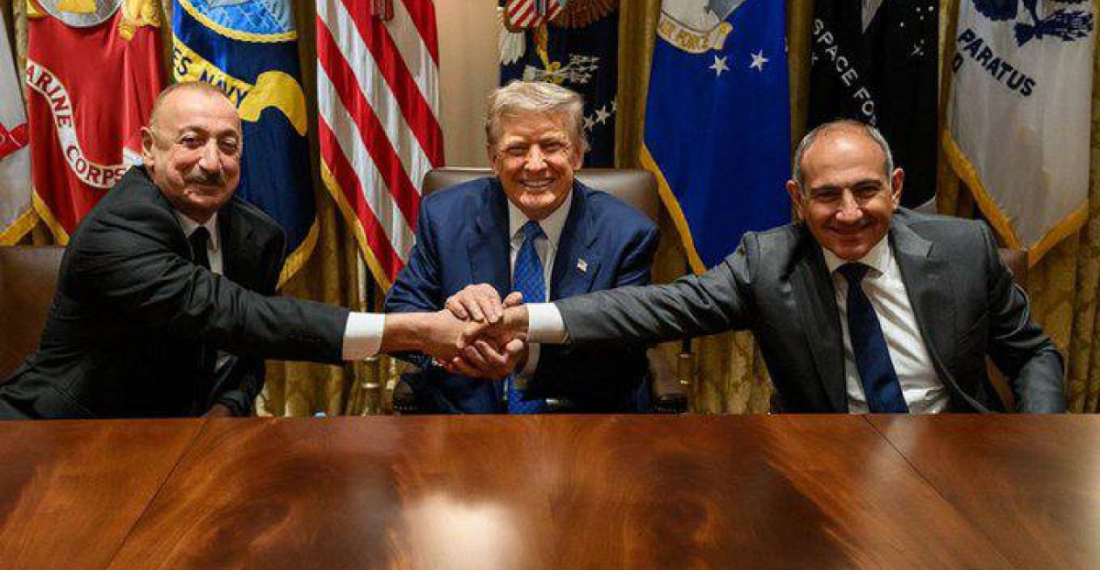President Donald Trump is right to describe the U.S.-mediated summit between the Armenian and Azerbaijani leaders on August 8 in Washington as a historic event. It is historic not only for its contribution to the peace process between the two countries, but also for the significant reshaping of the South Caucasus’ security order that it has set in motion. The day after the summit, the region woke up to a new reality – one markedly different from what had existed until recently.
Undoubtedly, the most significant outcome of the Washington summit for the people of the South Caucasus was the agreements signed between Armenia and Azerbaijan. The two countries initialed the peace agreement, agreed to sign it following the removal of territorial claims against Azerbaijan from Armenia’s state constitution, jointly appealed for the dissolution of the Minsk Group of the OSCE, and agreed on the opening of the Zangezur corridor. Until recently, most of these agreements were thought to be rather difficult to achieve anytime soon.
Although the two countries have been engaged in peace negotiations for the past five years following the Second Karabakh War, these efforts had previously yielded little progress. The sides remained at an impasse over key contentious issues – chief among them the Zangezur corridor and proposed constitutional amendments in Armenia that are necessary for the removal of territorial claims against Azerbaijan. While negotiations mediated by Russia, the European Union, and the Biden administration achieved some partial results, they ultimately fell short of delivering a comprehensive resolution to the conflict and paving the way for the normalization of relations and lasting reconciliation. As President Trump rightly said, “many tried, none succeeded”.
To be sure, the failure of his predecessors was not only the result of Armenia’s position but was inextricably linked with flawed strategies of mediators. Declaring that there will be no business as usual with Baku after the collapse of the separatist regime in Karabakh in September 2023 and re-imposing sanctions against Azerbaijan under the 907 Amendment of Freedom Support Act, the Biden administration undermined its mediating initiative and nullified its potential to play a meaningful role between the two South Caucasian republics. Similarly, the biased intervention of the pro-Armenian government of France’s President Emmanuel Macron into the EU-mediated talks brought the end of Brussels format that had been quite successful for a while. In the meantime, Russia, the former hegemon of the South Caucasus that brokered the ceasefire agreement during the Second Karabakh War, found itself in immense crises and troubles following its invasion of Ukraine. This, coupled with the disinterest of the local actors in Russia’s mediation due to various reasons, led to the termination of Moscow’s role in the peace process.
One of the most consequential agreements reached at the Washington summit concerns the conditions for opening the Zangezur corridor. First proposed in the Russia–Armenia–Azerbaijan trilateral statement signed after the Second Karabakh War in 2020, the corridor was originally envisaged to operate under the control of the Border Guards of Russia’s Federal Security Service (FSB). For Moscow, it carried immense geopolitical importance, as it would have cemented Russia’s presence in the region and placed it in a pivotal position to control transport links between Azerbaijan and Türkiye, as well as between Europe, Central Asia, and China. Since 2020, Russia has consistently underscored the trilateral statement as the indispensable basis for any agreement on the Zangezur corridor.
Today, however, the reality is very different. The corridor will open, but the trilateral statement has all but disappeared from public discourse. What is more, it will bear the name of the U.S. President – officially designated the Trump Route for International Peace and Prosperity (TRIPP) – and will be placed under U.S. control. Whatever specific arrangements are applied to the route, it is now clear that the third power responsible for its security and oversight will be the United States, not Russia, as initially envisaged.
This represents one of the most serious geopolitical setbacks for the Russian Federation in the entire post-Soviet period. It vividly illustrates Russia’s decline in the South Caucasus—though not yet its complete withdrawal. Moscow still controls two breakaway regions of Georgia and retains significant influence over Tbilisi’s foreign policy. Nevertheless, it now wields only limited influence in Armenia and virtually none in Azerbaijan – or over the transportation corridor that will soon connect the two.
As First Deputy Chairman of the State Duma Committee on CIS Affairs Konstantin Zatulin pointed out, the Washington agreement means pushing Russia out of the Caucasus and the arrival of the United States there and will pave the path of withdrawal of Russia’s military base from Armenia. Reacting more anxiously, a Russian political analyst characterized the deal on the Zangezur corridor a “stab in the back” of Russia noting that “in essence, an American semi-state military base is being created in Armenia”.
This development marks the culmination of a process that began with the Second Karabakh War, which ended the occupation of Azerbaijani territories by the Russia-backed armed forces of Armenia. Still, Azerbaijan is likely to remain committed to its multivector foreign policy, seeking to maintain friendly and constructive relations with its northern neighbor as well as with other major powers. For Moscow, the time has come to abandon imperial ambitions and engage with the countries of the South Caucasus – and other neighboring regions – as equal partners, not junior allies.






